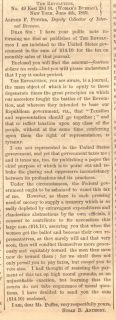 Susan B. Anthony articulated the commitment of the women’s suffrage movement to the realization of the principles of the American Revolution in a stinging rebuke of a federal tax collector. On June 2, 1869, Alfred F. Puffer, a deputy collector of internal revenue, wrote to Anthony in her role as publisher of The Revolution to collect $14.10 due on receipts. Anthony paid the tax, protesting that it violated a basic principle of the American Revolution—no taxation without representation. She published the exchange in The Revolution, Vol. III, No. 25 (June 17, 1869).
Susan B. Anthony articulated the commitment of the women’s suffrage movement to the realization of the principles of the American Revolution in a stinging rebuke of a federal tax collector. On June 2, 1869, Alfred F. Puffer, a deputy collector of internal revenue, wrote to Anthony in her role as publisher of The Revolution to collect $14.10 due on receipts. Anthony paid the tax, protesting that it violated a basic principle of the American Revolution—no taxation without representation. She published the exchange in The Revolution, Vol. III, No. 25 (June 17, 1869).
New York, June 4th, 1869
Dear Sir:
I have your polite note informing me that as publisher of The Revolution I am indebted to the United States government in the sum of $14.10 for the tax on monthly sales of that journal.
Enclosed you will find that amount—fourteen dollars ten cents—but you will please understand that I pay it under protest.
The Revolution, you are aware, is a journal, the main object of which is to apply to these degenerate times the great principles on which our ancestors fought the battles of the Revolution, and whereon they intended to base our Republican government, viz., that “Taxation and representation should go together;” and that to inflict taxation upon any class of the people, without at the same time conferring upon them the right of representation, is tyranny.
I am not represented in the United States government, and yet the government taxes me; and it taxes me, too, for publishing a paper the chief purpose of which is to point out and rebuke the glaring and oppressive inconsistency between its professions and its practices.
Under the circumstances, the Federal government ought to be ashamed to exact this tax of me. However, as there is such pressing need of money to supply the treasury which is so sadly depleted by extravagant expenditures and clandestine abstractions by its own officials, I consent to contribute to its necessities this large sum ($14.10), assuring you that when the women get the ballot and become their own representatives, as they surely will and that very soon, they will conduct themselves more generously and equitably toward the men than the men now do toward them; for we shall then not only permit you to pay taxes, but compel you to vote also. I had thought of resisting the payment of this tax on high moral grounds, but learning that the courts do not take cognizance of moral questions, I have decided to send you the sum ($14.10) enclosed.
I am, dear Mr. Puffin, very respectfully yours,
Susan B. Anthony